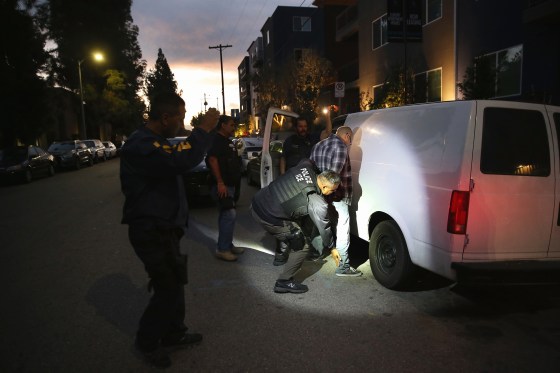
According to three people familiar with the plan, the incoming Trump administration plans to repeal a long-standing rule that has prohibited Immigration and Customs Enforcement officers from making arrests of foreign nationals at or close to so-called sensitive sites, like places of worship, schools, and hospitals, or at events like weddings, funerals, and public protests without supervisory consent.
According to individuals who spoke on condition of anonymity because they are not permitted to publicly discuss the move, President-elect Donald Trump intends to revoke the policy as soon as he takes office.
As part of Trump’s strategy to carry out what he has stated he wants to be the greatest deportation operation in American history, the action would increase ICE’s authority to make nationwide arrests of migrants and its speed in doing so.
Beginning with a memo written by then-ICE director John Morton in 2011, the policy prohibiting officers from making arrests in sensitive sites without authorization persisted throughout the first Trump and Biden administrations. With the hope that doing so would eventually benefit not only them but also the greater community, it was intended to permit undocumented immigrants to function freely in specific public locations.
Maintaining equilibrium has always been necessary for immigration enforcement. According to Lee Gelernt, an attorney with the American Civil Liberties Union, presidents of both parties have acknowledged in the past that just because it may be legal to make arrests at hospitals and schools does not imply that it is a humanitarian or prudent public policy.
We don’t want children to go without an education due to ill-considered deportation laws, or persons with infectious diseases to be too afraid to visit the hospital.
A national security or terrorist threat, the arrest of a dangerous felon, an immediate threat of death or bodily harm to a person or property, or a fear that evidence in a criminal investigation would be lost are just a few of the circumstances under which ICE agents are permitted to enter sensitive areas and make arrests.
However, even in those situations, agents needed to prepare an arrest in a sensitive area with the consent of superiors. When they believed that urgent action was necessary, they could also go in and conduct an arrest under exigent circumstances, but they would need to confer with superiors afterwards.
According to ICE data from October 1, 2017, to October 31, 2020, there were at least 63 planned and five urgent ICE arrests at or near a sensitive area during the first Trump administration.
In Project 2025, a set of policy recommendations disseminated by the Heritage Foundation before the election, there was a suggestion that Trump would permit ICE officers to make arrests anywhere, including within places of worship and schools, without the existing restrictions.
Church leaders are already discussing the effects of a policy change on sensitive sites after some claim they have been harassed for offering sanctuary space to migrants.
According to a deacon at a church in Arizona that has previously provided shelter for migrants, many churches and faith communities are extremely worried about potential reaction. Due to fears about their congregation’s safety, the church leader requested that NBC News refrain from using their identity.
The sensitive location regulation was not repealed by then-DHS Secretary John Kelly, who revised a number of ICE and Customs and Border Protection policies in January 2017, at the start of Trump’s first term.
According to a former DHS official, some agents who have felt hampered by limitations on their operating areas and who believe the policy has been misused by wanted individuals in the past may find relief from the sensitive locations policy modification.
The former official stated, “I believe there may have been a valid reason at the time.” It’s no longer required, in my opinion.
When deciding where to best execute an enforcement action, ICE agents already examine an individual’s circumstances, according to the former DHS official, and eliminating the guideline only lessens the administrative load.
The shift might put an end to the history of immigrants who have sought refuge from deportation by residing in sensitive places like churches, often for years, even though it would have wider ramifications. Church World Service, a faith-based group that monitored the number of persons seeking refuge in America, reported that at least 46 immigrants were sheltering in churches in 15 states in 2019.
Note: Every piece of content is rigorously reviewed by our team of experienced writers and editors to ensure its accuracy. Our writers use credible sources and adhere to strict fact-checking protocols to verify all claims and data before publication. If an error is identified, we promptly correct it and strive for transparency in all updates, feel free to reach out to us via email. We appreciate your trust and support!
